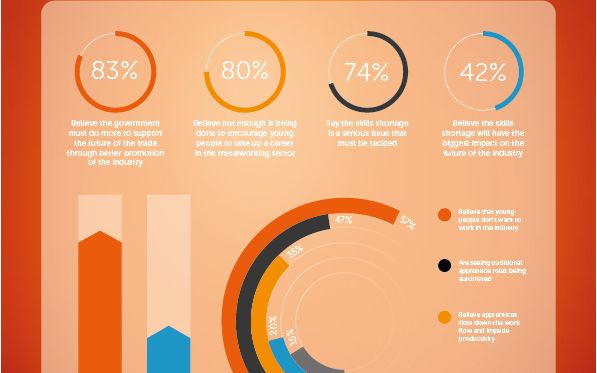80% of metalworkers believe not enough is being done to encourage young people to take up a career in the sector
Despite being one of the UK’s most prominent sectors, the metalworking industry is struggling to attract new talent and apprentices. Research recently commissioned by power tools and accessories manufacturer, FEIN, has uncovered that 80% believe not enough is being done to encourage young people to take up a career in the industry.
The same report also uncovered that 76% believe there are fewer younger people entering the metalworking sector year-on-year, while 42% believe the skills shortage will have the biggest impact on the future of the industry, with 74% confirming it’s a serious issue that must be tackled.
“With almost half of those surveyed believing that the skills shortage will be the greatest thing to impact the industry, it’s clear that more must be done at all levels of the sector to support emerging talent and attract the next generation of metalworkers.
“If combating this issue doesn’t take precedence for businesses moving forward, many fear their industry (and skillset) will soon become extinct, as high levels of skilled professionals continue to retire each year, with not nearly enough individuals entering the sector to fill the growing gap,” comments Raphael Rudolph, managing director of FEIN UK.
Further research also suggests there are core regions that are finding it challenging to recruit talent more than others, with Scotland’s welding industry struggling particularly to fill nearly 40% of its vacancies. On the opposite end of the spectrum, the north west is exceling in this area experiencing incredibly high demand for jobs in the sector. However, despite this, it’s clear that each region in the UK is struggling to attract new talent to fuel industry demand.
On the skills shortage, the research found that:
- 83% believe the government must do more to support the future of the trade through better promotion of the industry, further funding for training schemes and additional courses during education
- 57% believe that young people don’t want to work in the industry
- 47% are seeing traditional apprentice roles being automated
- 35% believe apprentices slow down the work flow and impede productivity
- One-third believe their role will ultimately be taken over by a robot
- 20% admit their company doesn’t take on apprentices or offer any training schemes
- 15% are fearful for the future of the industry
Despite the above, 60% of those questioned are hopeful for the future of the sector, with 88% stating that from the apprentices who are joining the industry, their contributions are invaluable, and they bring fresh ideas, drive and tenacity. Furthermore, half of those asked would like further training to enable them to provide additional support to emerging talent and give them the best start possible to their careers, with many looking to manufacturers, like FEIN, to provide this added support and training.
“While the research solidifies the fact that more needs to be done at all levels of the industry to tackle the skills shortage, there is hope and although there’s some room for improvements, those entering the industry appear to have the talent to drive business forward if provided with the right support,” concludes Raphael.
To find out more and to download the full ‘future of the metalworking sector’ report, visit https://www.fein.com/en_uk/knowledge/metalworking-sector-report/.
For further press information or requests, contact:
Refresh
Jessica Simm / Beth Whitehurst
Jessica@refreshpr.co.uk / beth@refreshpr.co.uk
07867 395631 / 07580 102019
The research
To form the research, FEIN asked 100 UK metalworking experts in the automotive, general fabrication, machinery manufacturing, offshore/shipbuilding, rail, steel production and sheet metal industries to provide honest insight on the issues impacting the industry and their pain points. The respondents also included, welders, production managers, product managers, operations managers, workshop managers/fabrication managers, fabrication operatives, HSE managers/officers, welding supervisors/managers and workshop supervisors/foremen, ensuring the findings are balanced and provide a true reflection of the state of the entire industry – across all levels.

